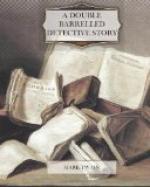“He has learnt me! I knew there was a way, if I would wait.”
After a matter of five minutes Buckner stole to the shaft, looking worried and uneasy, and peered down into it. He took in the situation; he saw what had happened. He lowered the ladder, and the boy dragged himself weakly up it. He was very white. His appearance added something to Buckner’s uncomfortable state, and he said, with a show of regret and sympathy which sat upon him awkwardly from lack of practice:
“It was an accident, you know. Don’t say anything about it to anybody; I was excited, and didn’t notice what I was doing. You’re not looking well; you’ve worked enough for to-day; go down to my cabin and eat what you want, and rest. It’s just an accident, you know, on account of my being excited.”
“It scared me,” said the lad, as he started away; “but I learnt something, so I don’t mind it.”
“Damned easy to please!” muttered Buckner, following him with his eye. “I wonder if he’ll tell? Mightn’t he?... I wish it had killed him.”
The boy took no advantage of his holiday in the matter of resting; he employed it in work, eager and feverish and happy work. A thick growth of chaparral extended down the mountainside clear to Flint’s cabin; the most of Fetlock’s labor was done in the dark intricacies of that stubborn growth; the rest of it was done in his own shanty. At last all was complete, and he said:
“If he’s got any suspicions that I’m going to tell on him, he won’t keep them long, to-morrow. He will see that I am the same milksop as I always was—all day and the next. And the day after to-morrow night there ’ll be an end of him; nobody will ever guess who finished him up nor how it was done. He dropped me the idea his own self, and that’s odd.”
V
The next day came and went.
It is now almost midnight, and in five minutes the new morning will begin. The scene is in the tavern billiard-room. Rough men in rough clothing, slouch-hats, breeches stuffed into boot-tops, some with vests, none with coats, are grouped about the boiler-iron stove, which has ruddy cheeks and is distributing a grateful warmth; the billiard-balls are clacking; there is no other sound—that is, within; the wind is fitfully moaning without. The men look bored; also expectant. A hulking broad-shouldered miner, of middle age, with grizzled whiskers, and an unfriendly eye set in an unsociable face, rises, slips a coil of fuse upon his arm, gathers up some other personal properties, and departs without word or greeting to anybody. It is Flint Buckner. As the door closes behind him a buzz of talk breaks out.
“The regularest man that ever was,” said Jake Parker, the blacksmith: “you can tell when it’s twelve just by him leaving, without looking at your Waterbury.”
“And it’s the only virtue he’s got, as fur as I know,” said Peter Hawes, miner.




